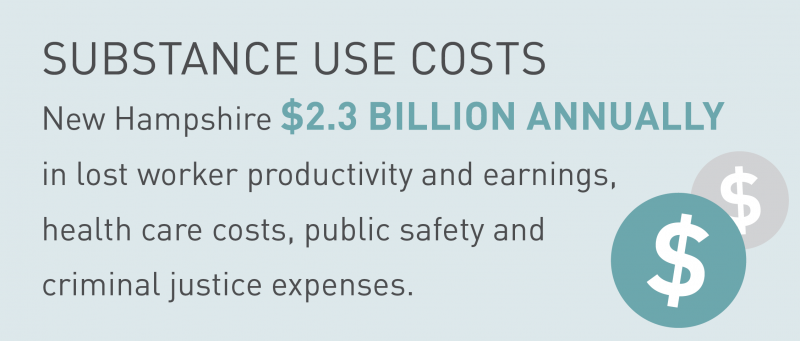Substance Use Prevention, Treatment and Recovery
Quality prevention programs like the Makin’ It Happen Coalition for Resilient Youth in Manchester help young people make healthy choices.
GOAL: All kids live healthy lives free of substance use
Why it matters
Catherine Jones was marching with her high school band when the group witnessed the scene of a drug overdose in Manchester. Quincy Roy has a family member who has suffered from a substance use disorder. Every kid has a story.
Members of the Makin’ It Happen Coalition for Resilient Youth see drugs and alcohol as a clear and present danger to their generation. And they have put their shoulders back and found their voices and are deflecting that danger with a potent weapon: the optimism of the young.
Makin’ It Happen is part of New Hampshire’s 13 Regional Public Health Networks that the Foundation supports with grant funding. More than 70 young people from eight schools have been trained on over-the-counter medication safety, and now train younger children. When they heard the president was coming to town, they dropped everything on a weekend to craft a message and figure out how to get him to hear it. Their example convinced leaders of a national Drug Enforcement Administration program to shift focus to youth and prevention. They have become accustomed to television cameras. They have met with the governor. They are thrilled when other kids want to join the work.
Quincy’s family member is in recovery and working again, buoyed by a 14-year-old’s efforts.

“We’re making kind of like a movement as youth,” Quincy says. Catherine adds: “It’s going to carry with us the rest of our lives.”
New Hampshire’s young people have some of the highest rates of substance use in the country. Addiction to alcohol and other drugs is a public health crisis that threatens our young people’s physical, emotional and economic well-being, devastates families, and has ripple effects across public health, public safety and the economy.
Prevention during adolescence is key: Adolescence through young adulthood is a critical period for brain development and the time when addiction is most likely to take root. Quality prevention programs, strategies and policies help young people make healthy choices and grow into healthy adults who will sustain our communities tomorrow.
And, for every dollar invested in prevention, treatment and recovery, up to $12 is returned in productivity and earnings, and in avoided health care and other societal costs.
All of our kids need the prevention education, leadership development and community support that helps them thrive. And, should they need it, young people deserve community support and access to the treatment that will help them recover.
Strategies and progress to increase opportunity
The Foundation is working to increase capacity-building support for nonprofits that provide treatment and recovery services; prevent substance use by expanding proven programs;expand the number of medical providers offering best-practice care for teens and for pregnant and newly parenting moms; and strengthen public policy and funding to expand prevention, treatment and recovery programs.
Significant progress has been made to date, including:
- New Futures and other Foundation grantees were instrumental in securing the passage of Medicaid expansion — giving at least 175,000 people access to health insurance that included coverage for addiction treatment. We continue to support advocacy efforts to increase health care access.
- More than 15,000 young people have been screened for substance use as the result of an evidence-based screening protocol that was implemented in 23 medical facilities across the state with support from the Conrad N. Hilton Foundation. Young people are now having meaningful and consistent conversations about substance use with their primary care providers.
- An anonymous $3 million gift to the Foundation is helping moms and babies affected by the state’s opioid crisis and other substance misuse to get well, and to thrive. This generous gift has improved systems, policies and practices for care of these women and infants statewide.
- The Foundation’s goal of a 5 percent decrease in youth alcohol use by 2017 was met in early 2015 and we continue to work toward further improvement.
- The Foundation continues to support critical and proven prevention and youth leadership programs in schools, such as Youth Leadership Through Adventure and Life of an Athlete, which drive culture change across school communities.
We're here to help
To learn more about ways to help New Hampshire's kids thrive, contact:

- Traci Fowler
- Initiative Leader, Behavioral Health
 603-225-6641 ext 243
603-225-6641 ext 243 Email Traci
Email Traci


